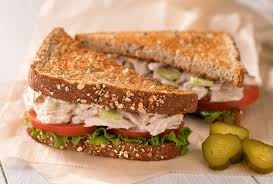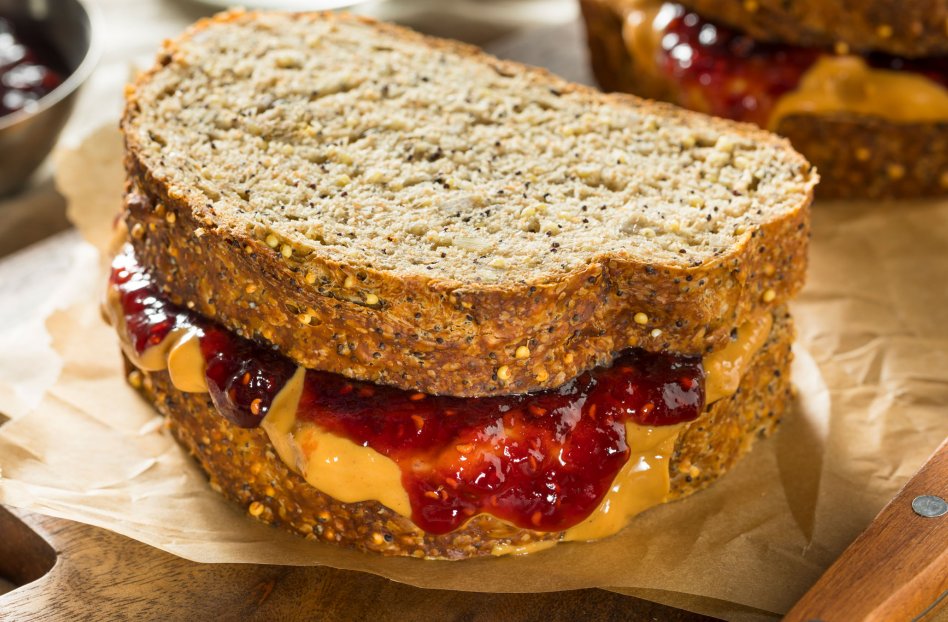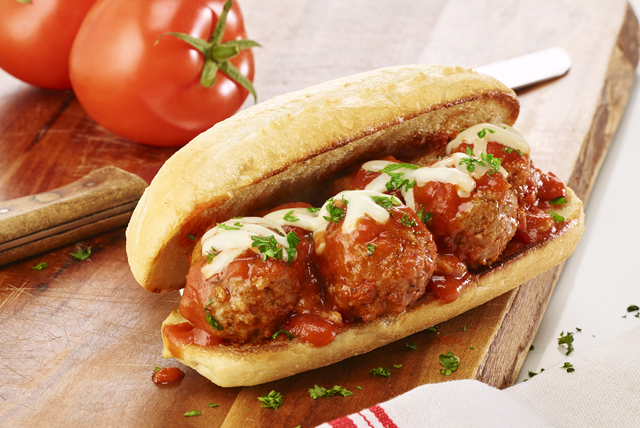The question of whether a turkey and cheese sandwich is healthy is a complex one, with no simple yes or no answer. It depends on a variety of factors, including the type of bread, cheese, and turkey used, as well as the other ingredients added to the sandwich.
To get a comprehensive understanding of the healthfulness of a turkey and cheese sandwich, let’s delve into the details of each component and analyze their nutritional value.
Bread: The Foundation of Your Sandwich
The bread you choose for your turkey and cheese sandwich can significantly impact its overall healthfulness. White bread, made from refined flour, is stripped of most of its nutrients and fiber, leading to rapid blood sugar spikes and potential weight gain.
Opting for whole-grain bread, on the other hand, provides a wealth of benefits. Whole grains are packed with fiber, which aids in digestion and promotes a feeling of fullness. They are also rich in vitamins, minerals, and phytochemicals that contribute to overall health and well-being.
Rye bread, in particular, stands out for its health benefits. Studies have shown that rye bread can help control hunger pangs for up to eight hours and can lessen blood sugar surges after meals.
If you have gluten sensitivity, sourdough bread is a good alternative. The natural fermentation process in sourdough breaks down gluten, making it easier to digest.
Cheese: A Source of Calcium and Protein
Cheese adds flavor and creaminess to your turkey sandwich, but it also contributes to its calorie and fat content. Choosing a low-fat cheese like mozzarella, Swiss cheese, or goat cheese can help keep the calorie count in check.
Goat cheese, in particular, offers a lower calorie option with a tangy flavor that complements turkey well. It also contains less saturated fat than many other cheeses.
However, it’s important to note that even low-fat cheeses can be high in sodium. If you’re watching your sodium intake, be sure to choose a low-sodium variety.
Turkey: A Lean Protein Powerhouse
Turkey is a lean protein source that provides essential nutrients like potassium, zinc, and niacin. It’s also a good source of tryptophan, an amino acid that supports healthy levels of serotonin, our “feel-good” chemical.
When choosing turkey for your sandwich, opt for pasture-raised turkey whenever possible Pasture-raised turkeys are typically leaner and contain more heart-healthy omega-3 fatty acids than factory-farmed turkeys
Additional Considerations: Enhancing the Healthfulness of Your Sandwich
Beyond the bread, cheese, and turkey, other ingredients can significantly impact the healthfulness of your sandwich.
-
Vegetables: Adding fresh vegetables like lettuce, tomatoes, and onions not only adds flavor and texture but also boosts the fiber and nutrient content of your sandwich.
-
Condiments: Instead of mayonnaise, which is high in calories and fat, opt for healthier alternatives like mustard, avocado, or low-calorie vinegar.
-
Fruits: Adding sliced apples or pears to your sandwich can provide a natural sweetness and additional fiber.
A turkey and cheese sandwich can be a healthy and satisfying meal option, but it’s important to be mindful of the ingredients you choose. Opt for whole-grain bread, low-fat cheese, and lean turkey, and don’t forget to add plenty of fresh vegetables and healthy condiments.
By making smart choices, you can enjoy a delicious turkey and cheese sandwich without compromising your health goals.
Additional Resources:
- Food Sanity: How to Eat in a World of Fads and Fiction by Dr. David Friedman
- Is it healthy to eat turkey sandwiches? – Quora
- The Healthiest Sandwich Options – WebMD
Disclaimer:
The information provided in this article is for general knowledge and informational purposes only, and does not constitute medical advice. It is essential to consult with a qualified healthcare professional for any health concerns or before making any decisions related to your health or treatment.
Dr. Friedman’s Health Blog

SANDWICH RANKINGS, FROM HEALTHIEST TO UNHEALTHY
A sandwich is a favorite meal for many, but which one is the healthiest? Are there some we shouldnt be eating? Today, I’m going to rank the most popular sandwiches — from healthy to the most unhealthy. But first, let’s talk about bread, the foundation of every sandwich. White flour, which is used to make white bread — is the absolute worst, since the bleaching process that it undergoes strips away all of the nutrients. Consuming white bread can cause a spike in blood sugar, weight gain, and inflammation. Whole-grain bread, on the other hand, is a much better choice. It’s loaded with fiber, healthy plant-based protein, vitamins, minerals and a variety of phytochemicals that help to improve digestion, reduce inflammation and lower cholesterol. Whole-grain bread also contains lactic acid, which promotes the growth of ‘good bacteria’ in the intestines. Rye bread is another healthy option. Research published in the Nutrition Journal shows that rye bread can help decrease hunger for up to eight hours. Another study published in PLOS Medicine found that whole-grain rye toast lessens blood sugar surges. If you are gluten sensitive, eat sourdough. It utilizes natural fermentation, which breaks down the gluten.
Alright, now it’s time to rank what goes between those slices of bread, from healthiest to unhealthy:
 Turkey Sandwich
Turkey Sandwich
Turkey Sandwich comes in at #1 for the most healthy. Turkey is high in protein and potassium, which are essential for building strong muscles, and has less fat than most other meats. It gives us needed zinc, which supports a healthy immune system and niacin, which helps lower cholesterol. Turkey also contains tryptophan, which helps support healthy levels of serotonin, our ‘good mood’ chemical. If at all possible, choose pasture-raised turkey as it contains more heart-healthy omega-3 fatty acids than turkey raised in factories.
Adding cheese to your lean turkey sandwich, however, can add a lot of fat and calories. For example, two slices of cheddar contain a whopping 226 calories and 18 grams of fat — not to mention, most cheese is loaded with sodium. To cut down on calories and fat, go with low-fat mozzarella, Swiss cheese or goat cheese. I prefer goat cheese on my turkey sandwiches. Its creamy flavor goes great with turkey and only adds 103 calories per ounce. Add some healthy lettuce, tomatoes and onions, and you have a grand slam healthy sandwich. 
Egg Salad Sandwich
My number two pick for the healthiest sandwich is egg salad. For decades we’ve been told that eggs contribute to high cholesterol and heart disease. The truth is, eggs are a nutritional super food! Eggs contain lecithin which actually helps lower cholesterol levels and protects against heart disease. In my book Food Sanity, I go into the history on why eggs have gotten such a bad reputation. Eggs are a wonderful source of protein and healthy fat (polyunsaturated and monounsaturated). One egg contains 6 grams of high-quality protein, as well as all nine essential amino acids, and is one of the few foods that contain naturally occurring vitamin D. When it comes to egg salad, hold the mayo! Just two tablespoons pack on 188 calories and 20 grams of fat. To make your egg salad healthier, opt for nonfat yogurt or avocado. Tuna Salad
Tuna Salad
Tuna is a rich source of vitamins B-12, B-6 and niacin. Niacin metabolizes carbohydrates, proteins, and fats into energy. Because elevated homocysteine levels are linked to a higher risk of cardiovascular disease, vitamins B-6 and B-12 help to remove the amino acid from the bloodstream. Tuna gives us 80% of our daily recommended amount of selenium, which research shows may help prevent cancer. It’s also high in omega-3 fatty acids, which is important for heart health and brain function. Three ounces of canned tuna only contains 108 calories. Add some chopped celery to your tuna salad for added fiber. It also helps support a healthy immune system.
Unfortunately, the fear of mercury is doing to tuna what the fear of cholesterol once did to eggs. It’s way over exaggerated and I debunk the “mercury fish farce” in my book Food Sanity. However, if developing mercury toxicity is a concern, go with Safe Catch brand of tuna. Their allowable limit for mercury is ten times stricter than the FDA’s mercury limit. Or, go with skipjack or Tongol (labeled “chunk light”), which is the smallest tuna with the least amount of mercury. Albacore has the highest level of mercury. Swap Greek yogurt or avocado for the mayonnaise or you can go with low-calorie rice vinegar, which is what I use to make mine. It helps aid with digestive health and supports a healthy liver.
 Peanut Butter and Jelly
Peanut Butter and Jelly
Although they were a childhood favorite, peanut butter and jelly sandwiches can be quite healthful for people of any age. Peanut butter is a great source of protein, B vitamins, iron, and zinc. Peanut butter is also a good choice for healthy unsaturated fat and will keep you full for hours. Because peanut crops are highly sprayed with pesticides, it’s best to use certified organic peanut butter. Also, avoid peanut butter with a bunch of added oils or sugar. There should only be two ingredients: peanuts and salt. If you have an allergy to peanuts, use almond or cashew butter.
For a healthier PBJ, use jam instead of jelly. Because jam contains the entire fruit, which helps to buffer the glycemic load (the rate at which sugar enters your bloodstream), it won’t spike your blood sugar as much as jelly. ) If you’re not fond of jam, use honey. Raw honey is loaded with vitamins, enzymes and powerful antioxidants.
The combination of peanut butter and honey tastes amazing.
Bacon, Lettuce and Tomato (BLT)
America is infatuated with bacon. The popular keto diet advocates consuming bacon and many people are doing that daily! However, there’s no research showing that bacon is healthy — in fact, evidence shows quite the opposite: The American Institute for Cancer Research performed one of the most in-depth studies to date. Hundreds of cancer researchers took part in a five-year project, and they reviewed more than seven thousand clinical studies that showed a link between diet and cancer. Their conclusion was, “Processed meat should be avoided for life.”
Bacon is the worst offender when it comes to processed meat. It contains a lot of saturated fat, which increases the risk of heart disease and stroke. Nitrates, which are preservatives found in most bacon, can cause bloating, hypertension, inflammation, cell damage, and joint issues.
Having said that, why does a BLT not rank lower on my list of healthy sandwiches? Because you can use turkey bacon in place of pork bacon. Just doing that cuts 80 calories and turkey is a healthier choice. The other two ingredients of the BLT also keep it higher on my list. Lycopene, an antioxidant found in tomatoes, has been connected to a number of health advantages, including a lower risk of cancer and heart disease. Tomatoes are also a great source of vitamin C, potassium, folate, and vitamin K. The lettuce of a BLT offers healthy fiber and provides calcium, potassium, and vitamin C.
Grilled Cheese
The traditional grilled cheese sandwich is made with American cheese. Sadly, two slices have 220 calories (90 percent fat), 12 grams of saturated fat, and 360 milligrams of sodium! The secret is to choose a cheese that is less fattening, such as vegan cheese, Swiss, goat cheese, or low-fat mozzarella. Add tomatoes to your grilled cheese and you’ll get the heart-healthy benefits of lycopene.
When making your grilled cheese, I recommend using something besides butter. There’s an ongoing butter debate and some health experts now believe consuming butter is healthy. I’m not one of them. I stay away from butter because it contains casein, a protein that has been connected to inflammation in the body, along with lactose. You’re better off using ghee, aka clarified butter, which is lactose-free. Ghee is also a better option than butter if you have allergies or sensitivities to dairy products. You can also use extra virgin olive oil or avocado oil.
 Ham and Cheese
Ham and Cheese
Ham isn’t the healthiest meat option because it falls into the “processed meat” category. Research published in PLOS Medicine found that eating ham may increase your risk for colon and lung cancer. Ham is also high in sodium. An average sized ham sandwich contains 1000 milligrams of sodium. Ham is also quite high in calories. Just one thin slice, weighing just 24 grams, contains 46 calories, a good portion of that coming from unhealthy fat.
If you’re craving a ham and cheese sandwich, baked ham without any nitrates and low sodium is the healthiest option.
 Mozzarella and Meatball
Mozzarella and Meatball
This sandwich comes in second to the last place as the most unhealthy sandwich. A 12-inch meatball marinara sub from Subway contains 1,160 calories, so if you decide to have one for lunch, you’ll need to jog 12 ½ miles to burn off all that meat! Meatballs are made of ground beef or a combination of ground beef and pork. They are high in fat and sodium.
For a far healthier and leaner option, try making this sandwich at home with ground turkey. If you choose to use ground beef, make sure the meat is USDA certified organic, which means it isn’t treated with hormones or antibiotics, and that it is fed on grass. As for the mozzarella cheese, opt for the reduced fat variety or try vegan mozzarella cheese.
 Philly Cheese Steak
Philly Cheese Steak
This tasty Philadelphia favorite ranks as my pick for the most unhealthy sandwich. A 12-inch cheese steak with provolone, peppers, onions, and mushrooms has a whopping 1,278 calories and 27 grams of fat, grease, and salt. 5 grams of saturated fat, not counting the extra 364 calories from the frequently served greasy fries. To burn all that off, you would need to perform about 1,500 vigorous jumping jacks, but I bet it would be difficult for you to do any after consuming this enormous brickwich.
The 1,480 milligrams of salt in a Philly cheese steak are also a concern for cardiologists, who may place paddles on your chest and declare, “CLEAR! If this sandwich doesn’t give you a heart attack, you’re more likely to get heartburn than from any other sandwich.” I recommend washing it down with some Alka Seltzer.
I could give some advice on how to choose the healthiest steak options and low-fat cheese alternatives for this sandwich, but I’d run the risk of alienating my Philadelphia pals. Enjoy this sandwich as an occasional indulgence and eat it at your own risk.
Whatever sandwich you consume, go easy on the condiments if you’re watching your weight. Commercially prepared ketchup is extremely high in high-fructose corn syrup, which has been linked to causing obesity. Mayonnaise is the worst condiment. Your sandwich gains 190 calories, 175 mg of sodium, and 22 grams of fat from just two tablespoons of mayonnaise. Instead, reach for mustard: A 1. 5-teaspoon serving of yellow mustard contains virtually no sugar and only adds five calories to your sandwich. Extra virgin olive oil and balsamic vinegar, is also a low calorie and healthier option.
The 2 Dollar Sandwich | But Cheaper
FAQ
Are turkey and cheese sandwiches healthy?
What is the healthiest sandwich to eat?
Is a turkey sandwich okay for weight loss?
How many calories are in 1 turkey and cheese sandwich?
|
Calories
|
380.0
|
|
Total Carbohydrate
|
40.0 g
|
|
Dietary Fiber
|
6.0 g
|
|
Sugars
|
9.0 g
|
|
Protein
|
25.0 g
|
Is turkey sandwich healthy?
Turkey Sandwich Turkey Sandwich comes in at #1 for the most healthy. Turkey contains less fat than most other meats and is rich in protein and potassium, needed for strong muscles. It gives us needed zinc, which supports a healthy immune system and niacin, which helps lower cholesterol.
Can one eat turkey sandwich with diarrhea?
Ideally, you should avoid processed and very fatty foods, such as ready-made sauces, fried foods and sausages, as well as foods that can cause the production of gases. During diarrhea it is important to prioritize easily digestible foods, lean meats, such as chicken and fish; and peeled fruits, which will help with digestion, control the volume of bowel movements and relieve stomach pain.
Can you eat a turkey sandwich with cheese?
Turkey also contains tryptophan, which helps support healthy levels of serotonin, our ‘good mood’ chemical. It’s best to go with pasture-raised turkey if possible because it provides more heart-healthy omega-3 fatty acids than factory-farmed turkey. Adding cheese to your lean turkey sandwich, however, can add a lot of fat and calories.
What is a healthy Turkey club sandwich?
Post a pic and mention @skinnytaste or tag #skinnytaste! A classic Turkey Club sandwich made healthy, piled high with turkey breast, bacon, lettuce, and tomato on whole grain bread, the perfect easy lunch.
